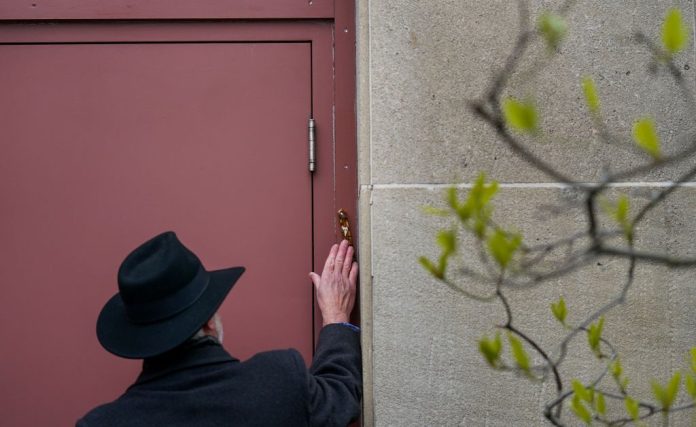WWhen I’m invited to speak about the Tree of Life synagogue massacre, I sometimes ask my audience, “How many mass shootings in the United States can you name?” I can see them starting to think counting their fingers while whispering to themselves, “Columbine, Sandy Hook, Parkland, Orlando…”
These are the four that almost everyone knows. For many people, the shootings at Mother Emanuel Church and the Uvalde, Texas, and Virginia Tech school shootings are also significant and have earned a place in their memories. But afterwards, people often find it difficult to think of anything else. After giving them half a minute to complete their lists, I always say, “I don’t know about you, but I can’t remember more than ten, and I’m an expert!” And they look at me grateful and relieved. They also couldn’t get more than 10.
The long-awaited trial of Robert Bowers, the alleged perpetrator of the 2018 Pittsburgh attack that killed 11 Jews attending Sabbath worship, has just begun. “Tree of Life” is one of those names, which has taken on multiple meanings: it’s a synagogue building that houses three different congregations, but now it’s also the name of an attack — the deadliest anti-Semitic attack in American history. And yet I have found that very few people have any connection to the “Tree of Life” at all. Like almost all mass shootings, it becomes more unforgettable than we can imagine. That’s sad – but I’ve also learned to accept the new normal. We are so deluged with news of violent crime that we are forced to remember and forget selectively.
So a trial like this against a perpetrator who is almost certainly guilty – he was caught red-handed – plays a useful role, not only in trying to bring justice to the violence, but also in bringing the people to the attack remember and the lives lost. For a few weeks or months we are reminded of a particular crime and the horror of that unique moment before another attack diverts our attention away from Pittsburgh and pushes Tree of Life to the back of our minds along with everyone else.
Continue reading: “Resilience, Strength, and Community Collaboration”: How the Tree of Life Synagogue is moving forward a year after the tragedy
At first I was concerned about the extent of our collective forgetting. For many years, the FBI considered any attack in which four or more victims died a “mass shooting.” In 2013, they lowered the number to three. Violent attacks in which, for example, ten people are injured but nobody is killed are still excluded from this definition. He also fails to capture firefights that hit people on both sides. Nevertheless, according to the federal government’s definition, there have been 144 mass shootings since 1982.
Given the many mass shootings we all endured, shouldn’t our thoughts be veritable atlases of bloody grief? Shouldn’t we be able to look at a map and extend our compassion across time zones to dozens of cities affected by this scourge?
Instead, I’ve found that alongside the few disasters we all seem to know about, we also remember those that seem personal to us, often for reasons of ethnic or geographic identity. Black people remember the shooting in Charleston, in a black church; Sikhs remember 2012 Wisconsin Sikh temple shooting; those in the LGBTQ+ community remember Orlando; Jews remember the attack on the 2018 meeting of the three congregations at the Tree of Life building in Pittsburgh that killed 11 Jews — half of all people inside.
But then there is another peculiarity: Even many of the Jews I meet seem to have only a vague memory of this attack. It’s not uncommon for me to mention the shooting of the tree of life to a fellow Jew, only to be met with a puzzled look on my face. When I remind them of what I’m talking about—“the Pittsburgh synagogue attack”—they generally think of the incident and remember it. But it’s not in her head — not in the way the three syllables of “Columbine” are ingrained in our collective memory.
Forgotten in many ways is our body’s adaptive survival response. But it is also a sign of the terrible times we live in. This kind of constant violence has stunned us, forcing us to trade renewed outrage for general despair. A process at least gives us permission to demand something – if not an end to the killing, then at least a chance for us to stand still and bear witness.
In fact, some of the attacks with the greatest collective impact have resulted in the deaths of young people. Perhaps we are all more affected by the horror of shortened lives than by the persistence of anti-Semitism and racism in Pittsburgh and Charleston. From time to time I wish that “Tree of Life” meant more to more people; I wish the term reminded us of the rising anti-Semitism that should concern us all. I wish it didn’t take such senseless murder to remind people what those words mean. But for now, that’s too much of a mass shooting; That’s the price of having one too many.
More must-reads from TIME
time.com
https://time.com/6276805/tree-of-life-trial-necessity-forget-mass-violence/















